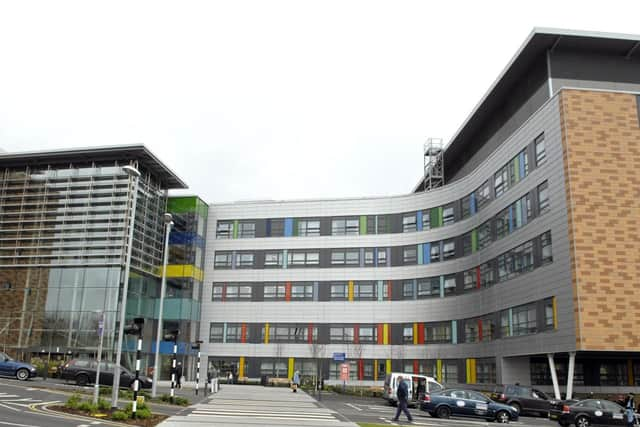NHS data sickness absence data show how coronavirus affected Portsmouth staff
and live on Freeview channel 276
NHS Digital data shows that in April the staff sickness and absence rate at Portsmouth Hospitals University NHS Trust (PHU) was 6.6 per cent – the highest level since records started in 2013.
During April last year, the rate was 3.6 per cent.
It means 13,772 full-time equivalent days of work across all staff groups in the trust were lost, from a total of 209,250 in April.
Advertisement
Hide AdAdvertisement
Hide Ad

The rate at Solent NHS Trust was 5.2 per cent – above the 4.4 per cent seen in the same month last year.
Across the country, more than a fifth of staff were absent for anxiety, stress, depression or other psychiatric illnesses.
Overall, the national NHS staff sickness rate was 6.2 per cent – the highest for any month on record.
The second most common reason for absences across the country was chest and respiratory problems.
Advertisement
Hide AdAdvertisement
Hide AdCovid-19 was not listed as a reason for sickness absence in the NHS data.
But a recent report by the trust that runs QA Hospital showed there had been a total of 1,404 staff absences related to Covid-19 – both confirmed and unconfirmed cases – between March 17 and July 13.
Miriam Deakin, director of policy and strategy at NHS Providers, said a survey found that 93 per cent of NHS trust leaders are now concerned about staff stress and burnout following the pandemic.
She added: ‘Looking ahead, we must not underestimate the lasting impact working during Covid-19 will have on NHS staff.
Advertisement
Hide AdAdvertisement
Hide Ad‘Trusts are doing all they can to support staff, including setting up a range of services such as relaxation and well-being hubs and safe spaces.
‘Additional support for staff will be a long-term requirement, as evidence suggests that staff are more likely to present much later, around two-and-a-half to seven years after experiencing trauma.
‘We will need to continue to track the mental health and wellbeing of the workforce to get a good understanding of the impact Covid-19 has had for years to come.’
But she added the rates also show ‘just how committed staff have been to taking care of people as well as trusts’ commitment to creating safe environments for their staff and patients’.
Advertisement
Hide AdAdvertisement
Hide AdThe data also showed the sickness absence rate across the South East was 6.5 per cent in April, making it the third highest of NHS England's seven regions.
The variation in sickness absence matched with the areas facing the biggest peaks of the coronavirus outbreak according to NHS Providers.
A message from the Editor, Mark Waldron
Thank you for reading this story. The dramatic events of 2020 are having a major impact on our advertisers and thus our revenues.
The News is more reliant than ever on you taking out a digital subscription to support our journalism. You can subscribe here for unlimited access to Portsmouth news and information online.
Every subscription helps us continue providing trusted, local journalism and campaign on your behalf for our city.
Comment Guidelines
National World encourages reader discussion on our stories. User feedback, insights and back-and-forth exchanges add a rich layer of context to reporting. Please review our Community Guidelines before commenting.